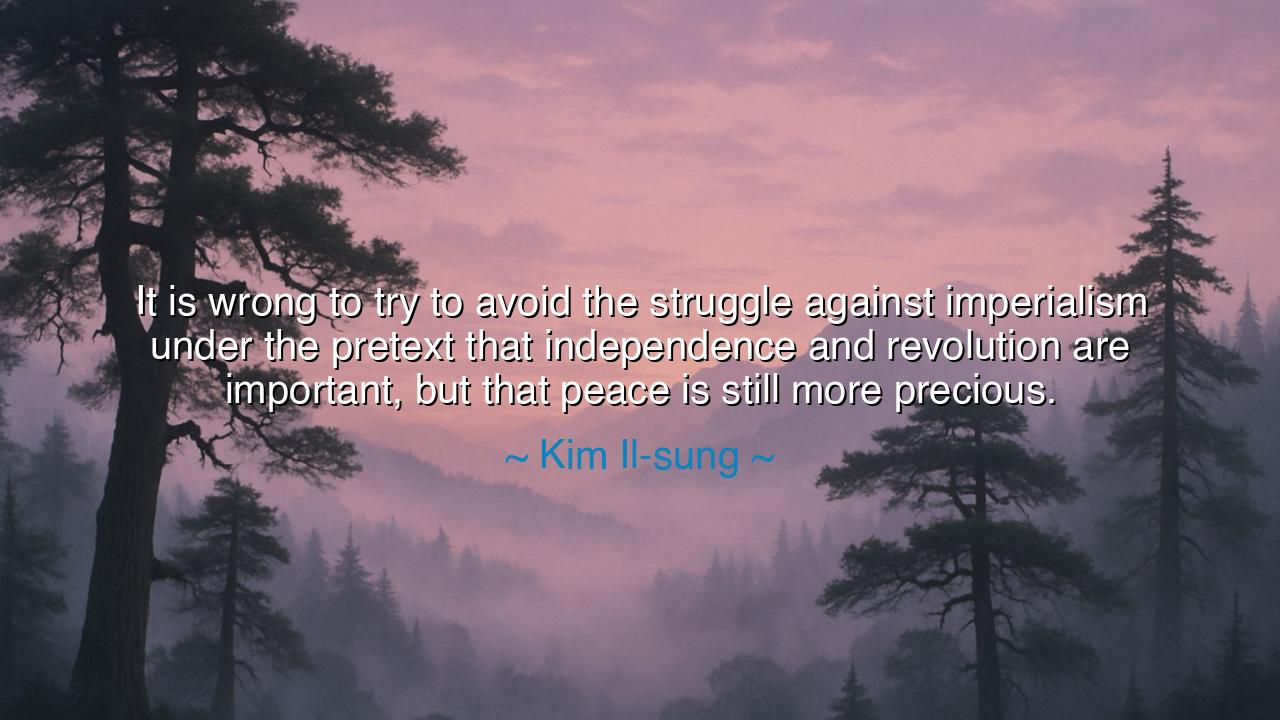
It is wrong to try to avoid the struggle against imperialism
It is wrong to try to avoid the struggle against imperialism under the pretext that independence and revolution are important, but that peace is still more precious.






When Kim Il-sung declared, “It is wrong to try to avoid the struggle against imperialism under the pretext that independence and revolution are important, but that peace is still more precious,” he was not merely voicing a political conviction — he was proclaiming a philosophy of struggle, the creed of a people who believed that peace without freedom is slavery, and quiet submission is the death of the soul. His words burn with the fire of resistance, echoing through an age when nations newly born from colonial chains wrestled with the question: what is the price of peace, and when does peace itself become betrayal?
The origin of this quote lies in the revolutionary thought of Kim Il-sung, founder of modern North Korea, who came of age amid the crucible of Japanese occupation. To him, the fight against imperialism was not optional; it was the natural duty of every oppressed nation. In his speeches, particularly during the mid-twentieth century when many countries of Asia and Africa were still shaking off colonial rule, he warned against the temptation to settle for comfort and compromise. His argument was simple and severe: true independence cannot coexist with submission, and a peace purchased by surrender is not peace at all, but quiet servitude.
Throughout history, this tension — between peace and justice — has tested the hearts of nations. The ancient prophets of Israel cried out that “peace, peace” means nothing when injustice reigns. Likewise, in the twentieth century, Winston Churchill stood almost alone in warning that appeasement of tyranny, though clothed in the language of peace, leads only to destruction. So too did Kim’s words rise from the same truth: peace that silences the spirit of resistance is the mask of conquest. The revolutionary must therefore learn that struggle, though painful, is sacred — for it preserves the dignity of a people even amid suffering.
In Kim Il-sung’s time, the wounds of imperialism still bled across the Korean peninsula. Japan’s decades-long occupation had left scars on the land and its people, and after liberation in 1945, new forces — political and military — sought to shape Korea’s destiny. Kim’s warning was not only against external domination, but also against internal complacency — the idea that peace could be declared without justice being secured. Like an ancient general admonishing his soldiers before battle, he taught that freedom requires vigilance, sacrifice, and the courage to confront those who would steal it under the name of stability.
To understand his teaching more deeply, let us recall the example of Toussaint Louverture, leader of the Haitian Revolution. When France, having abolished slavery, sought later to reimpose it in the name of “order” and “peace,” Toussaint refused. He knew that peace founded on chains was not peace, but humiliation. He fought to the end for liberty — and though he perished in a French prison, his people won their freedom. His struggle embodies Kim Il-sung’s principle: that there are times when struggle is life itself, and surrender, however peaceful, is death of the spirit.
Yet Kim’s quote is not only a call to arms; it is a call to discernment. He does not despise peace — he reveres it, but only when it flows from justice. For peace without freedom is submission, and revolution without purpose is chaos. The wise must therefore learn the sacred balance: to love peace, but not at the expense of truth; to value independence, but not at the cost of compassion. The struggle he describes is not only political — it is the inner battle within every human soul between comfort and conscience.
So, my children of the future, remember this teaching: never let the love of peace make you forget the duty of freedom. There will come times when the world will ask you to be silent — to trade your voice for calm, your integrity for comfort. Do not yield. For it is better to live in struggle with honor than to rest in peace under tyranny. True peace, as the ancients knew, is not the absence of conflict but the triumph of justice. Let your independence be both shield and torch — defending your dignity, and lighting the way for those still in darkness.






AAdministratorAdministrator
Welcome, honored guests. Please leave a comment, we will respond soon